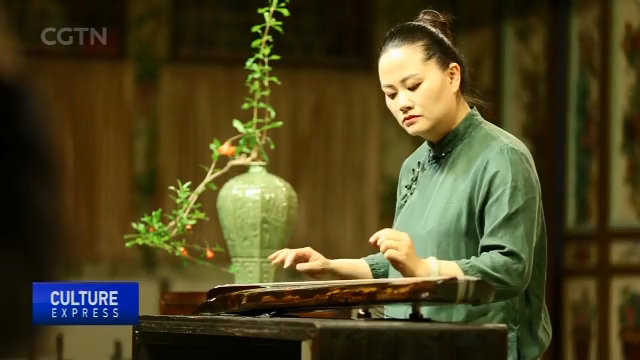
19:19, 20-Jul-2018
Guqin Gains Young Followers: College clubs help keep art of an ancient instrument alive
Updated
18:27, 23-Jul-2018
05:34

The Guqin is a seven-stringed Chinese musical instrument with a history of some three thousand years. In 2008, it was inscribed as a UNESCO World Intangible Heritage. Traditionally favored by scholars and literati as an instrument of great subtlety and refinement, the instrument is gaining more popularity among young people in China, thanks to concerts and student societies dedicated to the art. Next, we meet some modern-day practitioners of the Guqin and hear what THEY have to say about this ancient instrument.
The second Saturday in June is China's National Cultural and Natural Heritage Day, which includes performances in Beijing centering around the ancient instruments Guqin and Kunqu. This year there were eight performances from May 31st to June 5th at Prince Gong's Mansion, the Forbidden City Concert Hall and Tsinghua University.
The Guqin concert at Tsinghua University was performed by some of the best players in China and it was unexpectedly popular.
TIAN QING, DIRECTOR KUNQU & GUQIN RESEARCH INSTITUTE "Every year around the National Cultural and Natural Heritage Day, there are people asking me for tickets to the concerts, and asking who will perform and what pieces will be on the bill. I could never have imagined Kunqu and Guqin, these two heritage items, instead of being on the verge of extinction, would one day be so popular. For the past ten years, these two cultural heritage items have undergone a rapid recovery, revival and development."
The performances to promote Kunqu and Guqin began in 2011. Every year, some of the most influential Guqin players gather at universities to perform classic tunes and attract new fans to the ancient art. The performance series has accumulated many loyal devotees.
STUDENT FAN "It's a rare opportunity for us to see so many celebrated Guqin players perform in one single show. There are many college students now who are interested in traditional culture."
STUDENT FAN "Guqin music is not only about playing an instrument, it can also change your way of thinking. It provides you a place of serenity in the noisy and restless environment. It can calm you down."
There are now thirty-plus Guqin fan clubs on college campuses around the country. The Pinetree Guqin Society at Beijing Normal University is one of them. For the past eleven years, the club has been promoting the instrument and training young practitioners. Even with end-of-term exams approaching, no one is absent.
Graduate student Liu Hongwei, was once a trainee at the club. Now he's a tutor for new-comers. He tries to make every class as interesting as possible. His love of the instrument was imbued at middle school.
LIU HONGWEI, TUTOR PINETREE GUQIN SOCIETY, BEIJING NORMAL UNIVERSITY "My middle school music teacher told us this instrument is listed as World Intangible Cultural Heritage. That's a very good thing. But it was in danger of extinction and suddenly I felt a sense of responsibility."
After joining the Pinetree Guqin Club at college, Liu was always thinking of quitting because of the boring basic excises and the pain of fingers constantly pressing on the strings, but exchange activities between colleges have kept his interest alive.
LIU HONGWEI, TUTOR PINETREE GUQIN SOCIETY, BEIJING NORMAL UNIVERSITY "Previously I thought I was playing Guqin for myself. But as time went by, when you meet with other players of the instrument from other colleges or other walks of life, you feel it becoming a way of communication. It is not simply about being able to play a tune."
As well as attracting young fans, the instrument has seen middle-aged players growing more mature in the art. As the youngest inheritor of this intangible cultural heritage, Lin Chen still remembers people's curious expressions as they watched her carrying the big instrument box in her childhood.
LIN CHEN GUQIN PLAYER "A father told his son what I was carrying was a Chinese zither. When we started doing promotional activities, we didn't expect people would fall in love with the Guqin. Our basic wish was simple: to let them get to know the instrument."
From roughly one hundred players back in the late 1950s, the Guqin now has a large community of players and fans. This annual concert of college Guqin players is one of the platforms for young Guqin practitioners to shine on stage. It's sponsored by the Kunqu and Guqin Research Institute, but it's entirely organized by students. With so many avid promoters of the art, the future of this ancient art looks secure.

SITEMAP
Copyright © 2018 CGTN. Beijing ICP prepared NO.16065310-3
Copyright © 2018 CGTN. Beijing ICP prepared NO.16065310-3